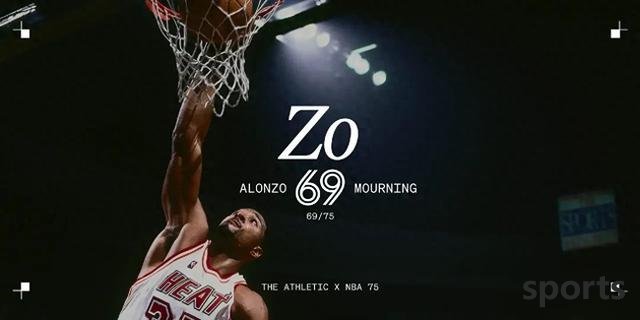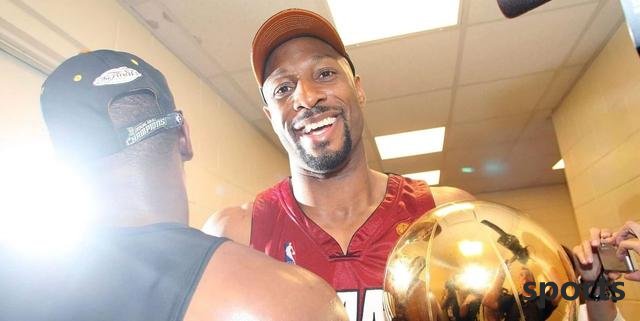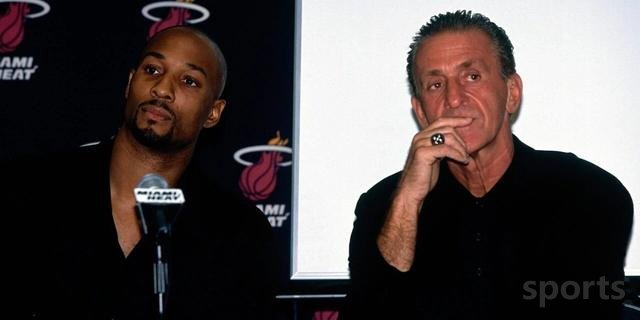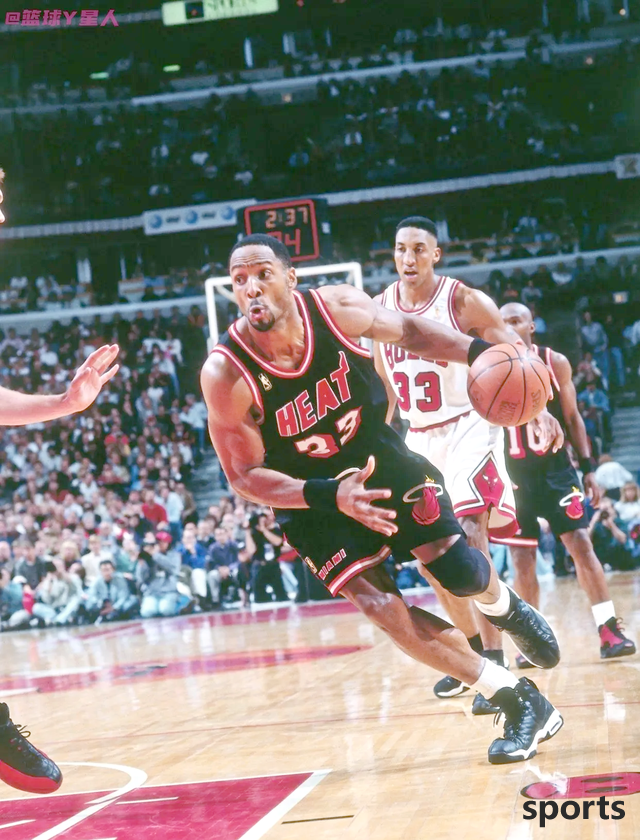QQ-Sports > Basketball > "Zo" Alonzo Mooning, TA s rating of NBA 75 Big 69
"Zo" Alonzo Mooning, TA s rating of NBA 75 Big 69

Alonzo Mooning regarded June 20, 2006 as the most glorious day of his career, the peak moment he dreamed of on the basketball court.
Miami Heat defeated the Dallas Mavericks in Game 6 of the NBA Finals and won the series with a total score of 4-2. Mo Ning finally won the championship trophy that he had been looking forward to for many years - after countless wonderful blocks, shocking dunks and personal honors, this championship is particularly precious.
The post-match celebration photos, his excitement could not be hidden. At 6 feet 10 inches, he held the Larry O'Brien trophy high above his head, and his smile was even more dazzling than the reflection of the 24-carat gold foil on the trophy under the stadium lights. The famous "angry man" on the field put away his signature serious face, his eyes full of relief and recognition.
"Apart from the birth of the children, winning that championship is the best thing in my life," Mourning told TA, "It's like climbing a mountain, climbing Mount Everest, and finally reaching the top of the mountain, and then he dares to breathe a sigh of relief. "
Patrick Ewing, Hakeem Olajuwon, Shaquille O'Neal, David Robinson - these top centers of the same era as Mourning have scored, rebounded, and blocked more in his career than him. But the data cannot tell the true greatness of Mourning. What makes him different from others is the tenacity of not admitting defeat.
Almost everyone will encounter at least one hurdle in their life, but Mo Ning encountered so many difficulties that it was unimaginable on the road to winning the championship 15 years ago. The broken original family, the days in the foster care system, and the life-threatening kidney disease are all the mountains in front of him. But he broke through one by one with a ruthless spirit, just like the fighting spirit he showed on the court when he was the core of the Charlotte Hornets, the Miami Heat and the New Jersey Nets.

Of course, Mo Ning also has noble people to help him on his journey of growth. Fanny Sriet was a teacher who raised him in Chesapeake, Virginia after his parents divorced and later adopted him. After becoming the top high school basketball player in the United States, Mourning entered Georgetown University and learned a lot from legendary coach John Thompson.
But no matter how powerful Srit and Thompson are, they cannot stop the rare nephropathy - focal segmental glomerulosclerosis. This disease can cause scars in the kidneys that are responsible for filtering blood waste. In 2000, Mooning was diagnosed, and the complications became more and more serious. In 2003, he had to undergo a kidney transplant. Less than a year after the operation, the future Hall of Famer made a bold decision: to return to the NBA.
"The first word that comes to mind is 'Fearless '," said Dave Twalzk. He is the former Hornets player personnel director and selected Mooning with the second pick in 1992. "The other word is 'Extreme Contender '. The Alonzo Mourning you see is the most real person, not pretending at all. "
The Hornets joined the league in 1988-89, and they couldn't even touch the side of the playoffs in the first four seasons. In the 1992 NBA draft, Larry Johnson, Kendall Jill and Dell Curry were on the team, but they lacked toughness. In the NBA in the 1990s, physical confrontation was common. Physical quality is final, and it is not easy to score. Although Michael Jordan has gradually become popular all over the world with three-pointers, many times it is still the world of big men. Now everyone remembers that it was Jordan's era, but at the beginning of the 1990s, Ewing, Olajuwon and Robinson were also preparing to show their strength.
So in the 1992 draft, O'Neal and Mourning became the favorites for the No. 1 pick. That spring draft draw, when league president David Stern announced the result, Twalzke stared at it - only three teams left to compete for the No. 1 pick: the Minnesota Timberwolves, the Orlando Magic and the Hornets. When Stern stated that Nissudan took the third pick, Twalzk immediately understood that no matter what the result was, the Hornets' fate was about to change. He was so happy that he turned to his wife Casey and blurted out: "We either have Shaq or Alonzo Mooning."
Mooning's defense in the penalty area was fierce - it was not a malicious injury, but a kind of tenacity that was particularly prominent in the era of focusing on defense. You just watch his regular season (838 games in total) or playoffs (95 games), and you will almost feel the same as Tvalzk and others: Mo Ningtian is not afraid of it.
"He doesn't care if we are a new team," said Dell Curry. "He has this attitude. Every night in the locker room, we are 'we're fighting against the whole world'. You will be infected when you are with him. "
Moning became the core as soon as he came, averaging 21 points, 10.3 rebounds and 3.5 blocks per game in the rookie season. Charlotte's record has been 44 wins and 38 losses in the 1991-92 season, and he is an indelible center. In the first round of the playoffs in the spring of 1993, the Hornets played against the Boston Celtics—the opponents were Reggie Lewis, Robert Parish, and Kevin McHale. Although Charlotte is not favored, they eliminated the Celtics in four games in the five-game three-win series.
Monning was finalized in the fourth game. With 3.3 seconds left in the fourth quarter, Boston led 103-102, Hornets coach Alan Bristol designed a tactic: serve Jill at the bottom line, let him score the winning goal, and Mourning went to the pick-and-roll. But the Celtics broke the tactics and Parrish assisted in defending the pick-and-roll, Dell Curry had to pass the ball to Morning, who was standing near the college three-point line.
"Zo (Mornin's nickname) never fears getting the ball," Dale Curry recalled, "Many players in the league, especially the center, are almost at the right time and dare not catch the ball at that position, but I know Zo is different. He is not afraid of missing the key ball, and I also believe that he can make a shot, and he is fully confident in him. "
Mornin moved a step to the right, adjusted at the top of the arc, and made a backward jump shot. The Hornets rushed over immediately and surrounded him before he stood up.. That was McHale's last game, and it also allowed everyone to see that Charlotte had a rising star.
When Mooning was a child, almost no one believed that he could play well. He has been tall since childhood - according to him, 9 years old, 5 feet 10 inches, 12 years old, 6 feet 2 inches. At the beginning, parents of his peers had high expectations for him, but after seeing him playing basketball, they changed. At that time, he was clumsy and had poor hand-eye coordination. He could feel that the adults who watched him play basketball thought he was just a child with no skills, but he just relied on his tall figure to bully young players and put on a few hats.
Now when I heard him say this, there was still some traces of injury in his tone. Some childhood injuries may not be able to heal completely even if they grow up and succeed. This may be the case with Mo Ning.
But these contempts also gave him motivation. Later, whether it was confronting O'Neal and Olajuwon, or facing the most terrifying opponent, focal segmental glomerulosclerosis, this motivation was supporting him.

"I used to be stupid and incongruous," said Mo Ning. "Growing up in a foster care system and living in a group dormitory, sometimes I felt a little 'better than human', after all, I grew up in that environment. But over time, this idea became resilience - not bowing to the environment, but overcoming it. "
In 2000, Mo Ning was about to become a superstar. He is only 30 years old and averages 21.1 points, 10.1 rebounds and 3.1 blocks in his first eight NBA seasons. In the 1998-99 and 1999-00 seasons, they also won the NBA Defensive Player of the Year. At that time, Ewing, Olajuwon and Robinson were all going downhill. It seems that O'Neal and Morning will continue to compete in the title of "Best Center" for the next ten years.
But then, Mo Ning's health was no longer good. He disclosed his kidney disease and was absent for most of the 2000-01 season. He played 75 games in the 2001-02 season, and had a complete break in the 2002-03 season.
The person who used to be fearless is now living in fear every day.
"It's so crazy," Mooning said, "The day before, I was on the top of the world: Olympic champion, All-Star, Best Defensive Player, Best Defensive Team. I won all these honors in a year, but in the second year - bang! - I had to retire. "
"I was so scared that I didn't know the disease at all, and I couldn't even read the name. When the doctor said that I needed a transplant, I thought to myself: 'They want to take out one of my organs and stuff one in? Maybe I have to dialysis three times a week? ' When I heard this, I was frightened, afraid that I wouldn't live. "
At the end of 2003, Mooning's cousin Jason Cooper donated his left kidney to him.
The complex surgery saved his life, but there was no guarantee that he could still shoot the basketball. Mo Ning said that he will never forget his first postoperative training - it will take 30 minutes to walk on the treadmill. He can lift 90 to 100 pounds of dumbbells before he gets sick, and 25 pounds after the transplant is terrible.
He must fight - he fought with his clumsy competition when he was a teenager, and he fought with Ewing and Olajuwon. After the transplant, he practiced for nine months. If it weren't for the resilience he had developed in childhood and youth, he wouldn't have been able to return to the NBA at all.

Mornin played for five seasons after the transplant, with a total of 216 games in the regular season. He wore a Nike-designed tights in every game, with a cushion inside, for fear that someone else would elbow to his new kidney.
"I don't think he plays for money," said Twalzk. "It's because he loves this game, loves competition, competes with his opponents, and helps the team win. He really loves it. "
When Mooning won that championship in Miami, he was a substitute. Although his competitive mentality has not diminished at all, he has never returned to his pre-ill condition.
"I know if I'm in good health, my career will definitely be better," he said. "Health problems have left me with 57 All-Stars, and maybe more than 20,000 points. "
But he said he was quite calm about all this. Now that I am 51 years old, I feel pretty good. Take anti-rejection medicine every day, eat a healthy diet, and keep exercising.
People who are often fighting kidney disease write to him, and he also raises money to support research to help improve everyone's understanding of this disease.
"I have experienced this for a reason," he said, "It is to bring inspiration and hope to those who support me along the way. They saw me overcome difficulties, return to the arena, and win the championship. So I think we can learn wisdom, strength and courage from other people's experiences. His path is harder than most people, but he is still inspiring us. "
Career data:
Games: 838 games, average : 17.1 points, 8.5 rebounds, 1.1 assists, shooting percentage: 52.7%, free throw percentage: 69.2%, win contribution value: 89.7, player efficiency value: 21.2
Honors:
Two selected for the NBA All-Star; Seven times All-Star; Two defensive player of the year DPOY (1999, 2000); 2006 NBA championship; 2014 Initial Hall of Fame
Related Posts
After another double-double, the contract of the new Lakers insider is definitely a value-for-money contract?
BasketballIn the previous NBA regular season, the Los Angeles Lakers relied on Austin Reaves' buzzer-beater to narrowly defeat the Minnesota Timberwolves at home 116-115. After this game, the Lakers' record improved to 3 wins and 2 losses; while the T...
moreAfter an unexpected four-game winning streak, the 76ers slowly became a super dark horse! Only Embiid gradually became an outsider.
BasketballThe NBA regular season has been open for more than a week. As in previous years, the situation in the east and west is chaotic, and many dark horses have emerged. The dark horse division in the Western Conference belongs to the Spurs. While Fox was...
moreThe first buzzer beater of the new season, Rivers’ single-core buzzer beater against the Timberwolves is trending, fans: MVP
BasketballOn the morning of October 29, the NBA regular season continued. The Lakers played away against the Timberwolves. The Lakers were still full of injured players, and key players such as Doncic, James Smart, Vincent, etc. continued to be absent. In the...
more
Hot Posts
- James announces a major decision early tomorrow morning! Su Qun: Is it the last dance or just an advertisement?
- The Lakers sign and 1 snatch, 21-man roster is released! Doncic loses his weight in a crazy way, and James creates history
- Just now! The Nuggets officially signed Kessler Edwards
- Pitino said: Modern basketball no longer has pure point guard
- Hu Mingxuan really thinks he is Curry, please pay attention to Guo Shiqiang s reaction, fans line up to apologize
- NBA triple-double star Westbrook joins the Kings
- Doncic has made efforts, and the Lakers are talking about the deal between Kneckett and Kleber!
- Bain s transaction value exceeds Doncic? Harrison was crazily mocked again: the worst general manager in history
- Lose 30 points and go home! The team that defeated James was eliminated by the Thunder. The more miserable the Timberwolves are, the more difficult the Lakers are.
- It s not reliable at all! The Thunder s powerful pitcher has almost no decent performance in the playoffs?
Recent Posts
-
European media evaluates EuroBasket s first MVP list! Vezinkov ranks first, and there are four players with NBA experience in the top five.
-
Both offense and defense! Capela appeared in the Rockets training hall, with a small hook shot with her left hand repeatedly, and she was too skillful
-
Warriors 103-93 Jazz, Tuch 15+5, Madson 22 points
-
The Rockets explore the method of replacing KD + staying in Green! The new 5-for-1 plan for replacing in the media: Jr. Jayson also stays all
-
Arenas hit back at Barkley: How did you perform in your 40-year-old final season? You are not qualified to belittle Old James
-
Freeze the aesthetics of the competition! Spurs reveal player highlight images
-
The questions asked by domestic reporters were so weird that both opponents and coaches were confused. Yang Hansen was under a lot of pressure because of this.
-
Can he play in the NBA? The Oregon coach is committed to following the example of Watanabe, and Lin Wei comes back from training to slap Guo Shiqiang in the face.
-
Domineering, Dillon Brooks sends a clear signal before the Rockets Game 7 against the Warriors
-
No passing or organizational ability! The Warriors backcourt star s only role on the court is defense?